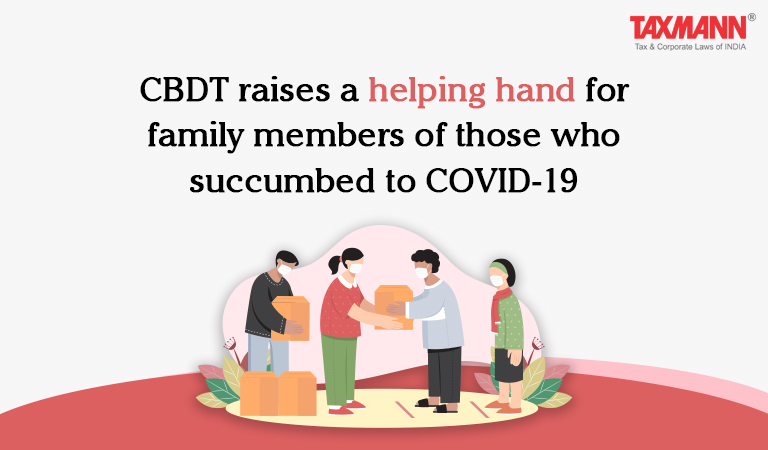CBDT raises a helping hand for family members of those who succumbed to COVID-19
- Blog|News|Income Tax|
- 3 Min Read
- By Taxmann
- |
- Last Updated on 10 December, 2025
Scope of the Income-tax Act, 1961, is not restricted to real income only. It also covers deemed income within its ambit. Section 56(2)(x) of the Income-tax Act, 1961 provides that where a person receives money or any property without consideration or for inadequate consideration, such receipt (or excess) would be chargeable to tax subject to a certain limit. Similarly, where an employee receives anything from its employer, the same is chargeable to tax under the head salary either as perquisite or otherwise.

During the COVID-19 pandemic, various families have received financial aid from the employer, relatives, and even unknown people. As a kind gesture, various companies have announced relief packages for the benefits to the family of the employee who lost his life while battling COVID-19. In some companies, employees have also contributed to provide financial assistance to the deceased’s family. Similarly, other well-wishers of such persons had extended financial assistance to their family members so that they could cope with the difficulties arising due to the sudden loss of the earning member of their family.
As per the provisions of the Income-tax Act, when an employer provides medical facilities to an employee or his spouse, children, dependent parents, dependent brothers, or dependent sisters in India, it shall not be deemed as perquisite in the following cases:
-
- If medical treatment is provided in a hospital maintained by the employer;
- If medical treatment is provided in a Government hospital or the prescribed hospitals;
- If medical treatment is provided in an approved hospital for the treatment of prescribed disease.
- If the employer provides group medical insurance.
If the employer provides medical reimbursement to the employees for routine check-ups, buying medicines, or treatment in any clinic, it shall be deemed a taxable perquisite.
Where such medical facilities are provided outside India, it shall be taxable as perquisite only if it exceeds the limit prescribed by the Reserve Bank of India. However, where a lump sum payment made gratuitously or by way of compensation or otherwise, to the widow or other legal heirs of an employee, who dies while still in active service, same is not taxable as income under the Income-tax Act, 1961 by virtue of Circular No. 573, dated 21-8-1990.
However, where any sum is received from a person, other than an employer, either for medical expenditure or on the death of an employee, the same is taxable under the head of other sources by virtue of Section 56.
To remove undue hardship on the family of the deceased or COVID-19 infected person, CBDT vide press release dated 25-06-2021 has decided to provide income-tax exemption in respect of the amount received by a taxpayer for medical treatment from an employer or any person for treatment of Covid-19 during FY 2019-20 and subsequent years.
Further, to provide relief to the family members of such taxpayer, the board has decided to provide income-tax exemption in respect of ex-gratia payment received by family members of a person from the employer of such person or other person on the death of the person on account of Covid-19 during FY 2019-20 and subsequent years.
However, the amount received on the taxpayer’s death will be exempt without any limit if such amount is received from the employer only. If such an amount is received from any other person, the exemption shall be limited to Rs. 10 lakh in aggregate for the amount received from any other persons. In other words, where the deceased family has received an amount over Rs. 10 lakhs from any person other than an employer will be taxable in their hands by virtue of Section 56(2)(x) under the head income from other sources.
Disclaimer: The content/information published on the website is only for general information of the user and shall not be construed as legal advice. While the Taxmann has exercised reasonable efforts to ensure the veracity of information/content published, Taxmann shall be under no liability in any manner whatsoever for incorrect information, if any.

Taxmann Publications has a dedicated in-house Research & Editorial Team. This team consists of a team of Chartered Accountants, Company Secretaries, and Lawyers. This team works under the guidance and supervision of editor-in-chief Mr Rakesh Bhargava.
The Research and Editorial Team is responsible for developing reliable and accurate content for the readers. The team follows the six-sigma approach to achieve the benchmark of zero error in its publications and research platforms. The team ensures that the following publication guidelines are thoroughly followed while developing the content:
- The statutory material is obtained only from the authorized and reliable sources
- All the latest developments in the judicial and legislative fields are covered
- Prepare the analytical write-ups on current, controversial, and important issues to help the readers to understand the concept and its implications
- Every content published by Taxmann is complete, accurate and lucid
- All evidence-based statements are supported with proper reference to Section, Circular No., Notification No. or citations
- The golden rules of grammar, style and consistency are thoroughly followed
- Font and size that’s easy to read and remain consistent across all imprint and digital publications are applied



 CA | CS | CMA
CA | CS | CMA
